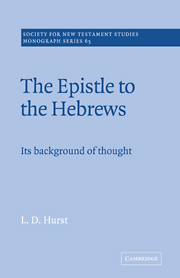1 - Philo, Alexandria and Platonism
Published online by Cambridge University Press: 20 November 2009
Summary
History of discussion
Since the mid seventeenth century it has been argued that to understand Hebrews one needs to know the works of Philo of Alexandria. The first thorough presentation of this approach was that of Ménégoz in 1894. He began a movement which so captivated critical opinion that for the first half of the twentieth century the Philonic background of Hebrews was felt to be one of the assured results of criticism. It is not difficult to list an impressive array of writers who either argue or assume the influence of Philo (and usually Plato) upon Auctor. The Philonic trend reached its apex in 1952 with Spicq's massive commentary, a tour de force probing vocabulary, hermeneutical techniques, psychology and special parallels with Heb. 11. Of particular significance for him was Auctor's use of the argument from silence, in which the lack of any genealogy for Melchizedek is theologically important (for the same argument used by Philo in other connections, cf., e.g., Leg. all. 1.60); the allegorical treatment of Melchizedek's name (“king of peace,” Heb. 7:3, Leg. all. III.79ff.); and the claim that certain things are “fitting” (ἕπρɛπɛν) for God (Heb. 2:10, Leg. all. 1.15). Spicq, however, did not depict Auctor as a thoroughgoing Philonist, since Auctor “repudiated resolutely” Philo's allegorical method in favour of a typological method close to Paul's. But his conclusion was that Auctor was a “Philonian converted to Christianity,” even suggesting that Auctor knew Philo personally.
- Type
- Chapter
- Information
- The Epistle to the HebrewsIts Background of Thought, pp. 7 - 42Publisher: Cambridge University PressPrint publication year: 1990
- 1
- Cited by



